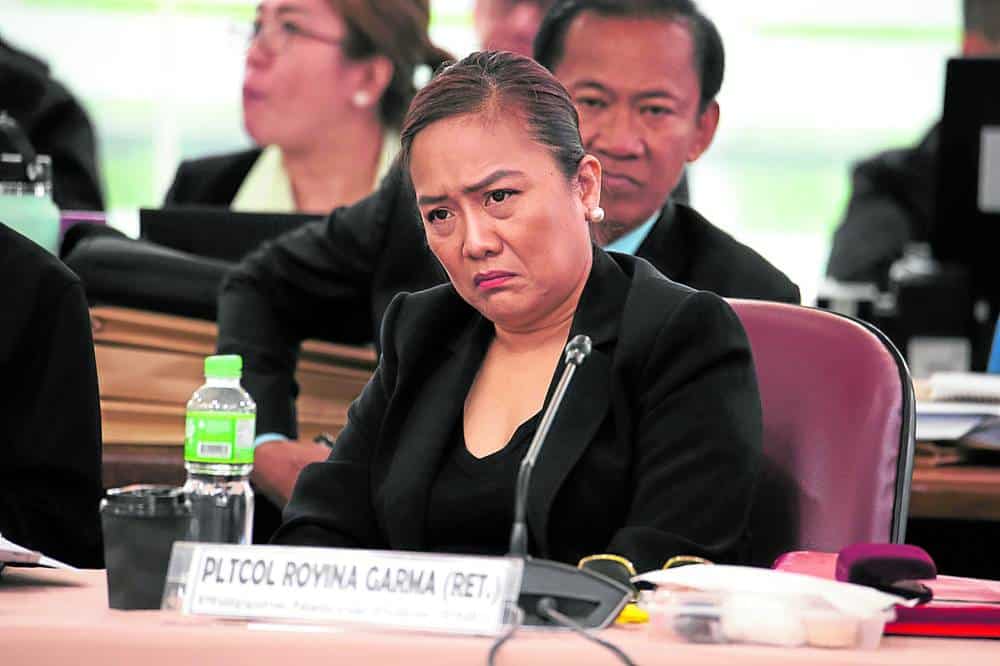
Former Philippine Charity Sweepstakes Office General Manager Royina Garma during the House of Representatives quadruple committee hearing. —Inquirer photo/Niño Jesus Orbeta
MANILA, Philippines — Retired police colonel and former state lottery official Royina Garma, who had made arguably the most damning allegation yet in the ongoing congressional inquiry into former President Rodrigo Duterte’s brutal war on drugs, was arrested in the United States last week after her visa was canceled, according to the Department of Justice (DOJ).
Justice Secretary Jesus Crispin “Boying” Remulla has instructed the Bureau of Immigration to facilitate the repatriation of Garma, who was detained by US border control authorities on Nov. 7 in San Francisco, California.
READ: Garma: Telling real drug war stories aims to restore public trust in PNP
Garma and her daughter flew to San Francisco via Philippine Airlines Flight PR104, and were marked out by the US Immigration and US INS (Immigration and Naturalization Service), Interior Secretary Jonvic Remulla, brother of the DOJ chief, said on Tuesday.
“Over the course of the Senate hearings, her visa was canceled. It appears she tried her luck and went to the US,” Jonvic Remulla said in a press briefing, adding: “We don’t know why Garma’s visa was canceled. Actually, it’s the US prerogative to cancel it. From what I know, they will inform you if your visa is canceled. I’m sure she was informed.”
“They are currently detained and they are in the process of being sent home here back in the Philippines,” Jonvic Remulla said of Garma and her daughter.
Called to testify in the House investigation into extrajudicial killings (EJKs) linked to the Duterte drug war, Garma initially denied involvement in the death of three Chinese drug convicts in August 2016.
But she later made a turnaround and revealed the existence of a reward system allegedly put in place by Duterte himself for killing drug suspects during the six-year crackdown.
In the course of the House probe, Garma was also implicated in the July 2020 ambush that killed then-Philippine Charity Sweepstakes Office (PCSO) board secretary Wesley Barayuga.
At the time, Garma was the general manager of the PCSO, where she was appointed by Duterte following her retirement from the police service.
No pending PH cases
Garma may be expected to return to the Philippines “anytime within the next 10 days,” Boying Remulla said.
Once back in the country, however, Garma is free to go home since there are no pending charges against her in the Philippines, the justice secretary added.
But the government, he said, plans to “offer her protection” and ensure she remains in contact with authorities to prevent similar issues in the future.
“In any case, she’s considered a very important witness by the quad comm. That’s why we intend to offer her witness protection for that matter,” Boying Remulla told reporters in a chance interview.
He said DOJ prosecutors had already interviewed Garma as part of the ongoing case buildup being handled by a newly established task force looking into the drug war killings.
“We’re still conducting a case buildup. In any case, that’s already included in the task force. The purpose of the case buildup is to ensure that the cases to be filed are strong cases. We cannot just file cases that have no legal basis or evidence,” he said.
“She may be part of it in one way or the other or she may be a suspect in one way or [another]. But just the same, we’re doing this also respecting the wishes of the quad comm. Because we know she’s considered as an important witness by the quad comm,” Remulla added.
Released by House
The House quad committee on Tuesday confirmed that it released Garma from weeks of detention since she had finished serving the penalty for her contempt citations in past hearings.
Committee chair and Surigao del Norte Rep. Robert Ace Barbers said the panel had “moved forward” from the issues on which Garma testified, referring to the alleged drug war reward system and the Barayuga killing.
The committee did not receive any formal notification about Garma’s trip to the US or why she was arrested, he said.
Earlier bid to enter US
During her first appearance before the quad committee on Sept. 12, Garma said she once attempted to enter the United States in August but was forced to return because her visa was canceled.
In an earlier Inquirer interview, human rights lawyer Kristina Conti, a counsel to the families who lost loved ones in the drug war, said Garma’s visa was canceled possibly because of US restrictions on persons being linked to human rights violations.
Conti saw parallels between Garma’s case and that of former national police chief and now Sen. Ronald dela Rosa, the one-time chief enforcer of the drug war, whose US visa was also canceled.